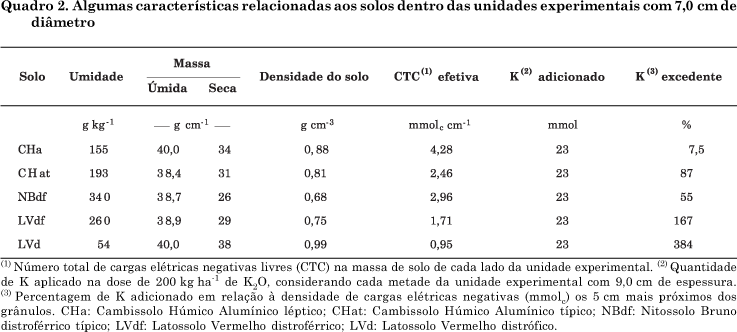In recently fertilized soils, plants uptake nutrients mainly from around the granules, but little is known about the chemical composition of these zones. This study aimed to evaluate the K concentration gradient as well as the electrolyte concentration around KCl granules applied at different rates to five soils varying in clay (95 to 569 g kg-1) and organic matter (13 to 54 g kg-1) contents. Treatments consisted of four KCl rates (0, 50, 100, and 200 kg ha-1 K2O). These quantities were obtained by simulating a KCl application to 357 m² ha-1 of soil (broadcast over the soil surface in a band of 2.5 cm in rows spaced 0.7 m apart). Each experimental unit consisted of two joined PVC tubes (diameter 7.0 cm, length x 9.0 cm) filled with soil. KCl granules were uniformly broadcasted between two round filter paper sheets (diameter 7.0 cm), which were placed on the junction of the two tubes. The K concentration gradient of the soils was quantified based on the exchangeable K concentration at different distances from the point of application. K diffusion varied with the soil type, increased with the KCl rate and was lowest in the soil with the highest sand and lowest organic matter contents. After seven days, K diffusion in the soils was highest in an Inceptisol (8.4 cm) and lowest in an Oxisol (6.4 cm). K concentration in the first soil centimeter closest to the fertilizer varied from 9,800 to 16,475 mg kg-1; four centimeters further, it varied from 244 to 2,254 mg kg-1. The electrical conductivity did not attain detrimental values for seed germination of moderately salt-tolerant species, even in the centimeter closest to the fertilizer. A movement of K was observed after few days in the soils, but the maximum diffusion at each KCl rate did not correlate with any soil attribute.
diffusive flux; exchangeable K; electrical conductivity; KCl




